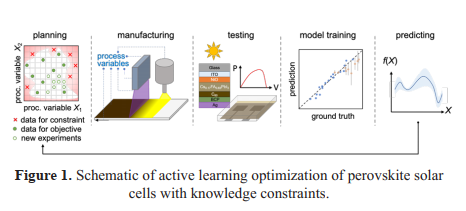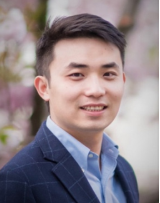Active Learning with Knowledge Constraints for Process Optimization of Perovskite Solar Cells
Zhe Liu1, *,Nick Rolston2,Reinhold Dauskardt2,Tonio Buonassisi3
1 Northwestern Polytechnical University, Xi’an, Shaanxi, China
2 Stanford University, Stanford, CA, U.S.A
3 Massachusetts Institute of Technology, Cambridge, MA, U.S.A
EXTENDED ABSTRACT: Perovskite solar cell has achieved rapid development in the research labs in terms of the power conversion efficiency (PCE); however, successful commercialization still requires further development of low-cost, scalable, and high-throughput manufacturing techniques. One of the key challenges to develop a new fabrication technique is the high-dimensional process optimization. Active learning, an iterative framework of machine learning for experimental planning, is known to be effective for high-dimensional optimization tasks. The current reports of active learning studies have one common drawback: the framework tends to take human out of the loop, e.g., disregarding knowledge or insights from human experts. Herein, we developed an ML manufacturing process optimization framework that combines the output of a regression-based model (learning by doing) with probabilistic knowledge constraints (physical intuition and previously collected data) in sequential learning, as in Figure 1. As an example, we show a visual assessment of film thickness, color, and large asperities has been used as an effective screening method, which can be implemented as a probabilistic constraint in the active learning loop. With the framework, we optimized six parameters in the rapid spray plasma processing (RSPP) technique. Process optimization enables 18.5% efficiency from 18.0% before the study. The resulting acceleration factor to achieve this highest efficiency is 3X compared to pseudorandom or one factor at a time sampling method. We envision this framework can be further developed to enhance human-machine interaction, and facilitate wider adoption of active learning methods in.


Prof. Zhe Liu completed his bachelor’s degree (2012) and Ph.D. degree (2016) in Electrical and Computer Engineering at National University of Singapore (NUS). After graduation, he continued his postdoctoral research at Massachusetts Institute of Technology (MIT) from 2017 to 2020 and obtained Research Scientist position at Singapore-MIT Alliance for Research and Technology (SMART) from 2020 to 2021. Dr. Liu has published 35+ journal articles and conference papers, delivered 10+ talks at international conferences, and filed two U.S. patents. He is known for conduct industrially relevant research and tackle highpriority challenges in PV manufacturing. He is currently serving in the program committee of the IEEE PVSC and being a guest editor for scientific journals (e.g., IEEE JPV).